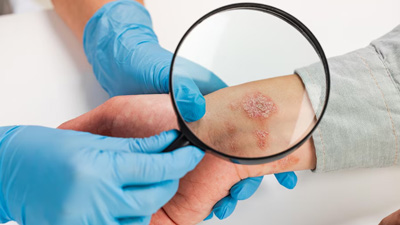
Psoriasis is an autoimmune skin condition that causes skin cells to multiply up to 10 times faster than normal. This leads to inflamed, red, and itchy silver-white scales on the skin. According to StatPearls Publishing, psoriasis has a prevalence ranging from 0.2% to 4.8%, and while the exact cause is unknown, one primary cause is its genetic predisposition, indicated by its familial occurrence.
Table of Content:-
Psoriasis management is key to reducing symptoms and avoiding further complications. It can involve a combination of treatments, including topical, systemic, and phototherapy. However, in this article, we will discuss the best morning skincare routine that can provide relief to people with psoriasis.
Also Read: Is It Safe For People With Psoriasis To Get Tattoos?
Gentle Cleansing

According to Dr Geetika Srivastava, Dermatologist, and Founder of Influennz Skin and Hair Clinic, Delhi, psoriatic skin is highly sensitive with a compromised barrier. Therefore, choosing a gentle, non-foaming cleanser is essential, she says, warning against harsh face washes, exfoliants, and scrubs that contain AHA, BHA, or retinol. As per the doctor, these ingredients may irritate the already sensitive skin and exacerbate psoriasis symptoms.
Instead, opt for a cleansing milk, balm, or oil. These products hydrate and clean without stripping natural oils, which are crucial for maintaining the skin barrier.
Moisturising With Peptides And Ceramides
The cornerstone of psoriasis skin care is hydration, says Dr Geetika.
She adds, “Psoriasis often leaves the skin dry and flaky, and moisturising helps soothe and repair the damaged barrier. A peptide- and ceramide-based moisturiser provides deep hydration, reduces scaling, and helps restore the skin barrier. Ceramides reinforce the skin’s protective layer, while peptides promote healing.”
If you’re someone who is into natural remedies, the dermatologist recommends applying coconut oil, as it locks in moisture, reduces inflammation, and softens psoriatic plaques. However, be sure to apply it after showering when your skin is still slightly damp to maximise absorption.
Sun Protection With SPF![]()
Moderate sun exposure can benefit people with psoriasis as it may help reduce inflammation and promote healing. However, excessive UV damage should be prevented with the help of a broad-spectrum SPF, particularly on the face, as facial skin is more prone to UV-related ageing and damage.
Aim for 15 minutes of daily sun exposure on the affected areas during peak hours (10 a.m. to 4 p.m.) to help alleviate symptoms, but avoid staying out too long to prevent sunburn.
The American Academy of Dermatology (AAD) recommends that everyone use sunscreen that offers the following:
- Broad-spectrum protection (protects against UVA and UVB rays)
- SPF 30 or higher
- Water resistance
Also Read: Explainer: Can Sunscreen Protect Against Skin Cancer?
Topical Treatments For Psoriasis Lesions

Symptoms of psoriasis may differ in people, with some experiencing patches of thick, silvery-white scales that itch, also known as plaque psoriasis, or dry cracked skin that bleeds, or both.
People who develop psoriasis lesions must consult their dermatologist for topical treatments.
Products like topical steroids or a combination of coal tar and corticosteroids can help manage flare-ups, according to Dr Geetika, who shares other effective options, which include immunomodulators like tacrolimus or calcipotriol, which reduce inflammation and improve skin turnover in psoriatic areas.
Always apply these treatments as prescribed after moisturising.
Conclusion
Psoriasis is a skin problem that requires proper management. A well-structured morning routine can significantly help reduce psoriasis symptoms and promote healthier skin. Incorporating gentle cleansing, moisturising, sun protection, and stress-relief techniques into your daily regimen helps manage flare-ups and provides long-term relief. Consistency in skincare and a mindful approach to triggers will help you have better control over the condition.
How we keep this article up to date:
We work with experts and keep a close eye on the latest in health and wellness. Whenever there is a new research or helpful information, we update our articles with accurate and useful advice.
Current Version
